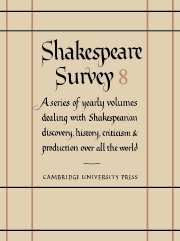Book contents
- Frontmatter
- The Interpretation of Shakespeare’s Comedies: 1900–1953
- Comic Form in Measure for Measure
- Troilus and Cressida
- As You Like It
- The Integrity of Shakespeare: Illustrated from Cymbeline
- Shakespeare’s Comic Prose
- A Note on a Production of Twelfth Night
- Producing the Comedies
- The New Way with Shakespeare’s Texts II. Recent Work on the Text of Romeo and Juliet
- The Significance of a Date
- Of Stake and Stage
- The Celestial Plane in Shakespeare
- International Notes
- Shakespeare Productions in the United Kingdom: 1953
- Shakespeare at Stratford, Ontario
- Plays Pleasant and Plays Unpleasant
- The Year's Contributions to Shakespearian Study 1 Critical Studies
- 2 Shakespeare’s Life, Times and Stage
- 3 Textual Studies
- Books Received
- Index
- Plate section
2 - Shakespeare’s Life, Times and Stage
Published online by Cambridge University Press: 28 March 2007
- Frontmatter
- The Interpretation of Shakespeare’s Comedies: 1900–1953
- Comic Form in Measure for Measure
- Troilus and Cressida
- As You Like It
- The Integrity of Shakespeare: Illustrated from Cymbeline
- Shakespeare’s Comic Prose
- A Note on a Production of Twelfth Night
- Producing the Comedies
- The New Way with Shakespeare’s Texts II. Recent Work on the Text of Romeo and Juliet
- The Significance of a Date
- Of Stake and Stage
- The Celestial Plane in Shakespeare
- International Notes
- Shakespeare Productions in the United Kingdom: 1953
- Shakespeare at Stratford, Ontario
- Plays Pleasant and Plays Unpleasant
- The Year's Contributions to Shakespearian Study 1 Critical Studies
- 2 Shakespeare’s Life, Times and Stage
- 3 Textual Studies
- Books Received
- Index
- Plate section
Summary
The aspect of Shakespeare’s life and times which seems most interesting to researchers at present is the range of his reading and what this may indicate about his intellectual development. Foremost in this field is Virgil Whitaker’s Shakespeare’s Use of Learning, which attempts to chart not only Shakespeare’s reading and acquisition of knowledge, but also its effect upon his development as dramatist. As the book proceeds, it concerns itself less and less with the first and more and more with the second of these themes. This change-over is complete by the discussion of Troilus and Cressida, which Whitaker regards as “the keystone in the arch of Shakespeare’s intellectual development” and “a philosophical poem expounding the ideas fundamental to his tragedies”. The attempt made here to trace the extent of Shakespeare’s knowledge involves three assumptions which seem to be fallacious and therefore to vitiate many conclusions drawn in the first part of the book. Whitaker first assumes that because we know some of the text-books used in some Elizabethan schools, we can safely infer what Shakespeare was taught at his grammar school. This will be quite unacceptable to anyone aware of the diversity of teaching in our grammar schools even as recently as forty years ago, when they were still staffed by learned individualists whose special interests were apparent in the curriculum as well as in their teaching, and unconfined by external examinations.
- Type
- Chapter
- Information
- Shakespeare Survey , pp. 146 - 153Publisher: Cambridge University PressPrint publication year: 1955

